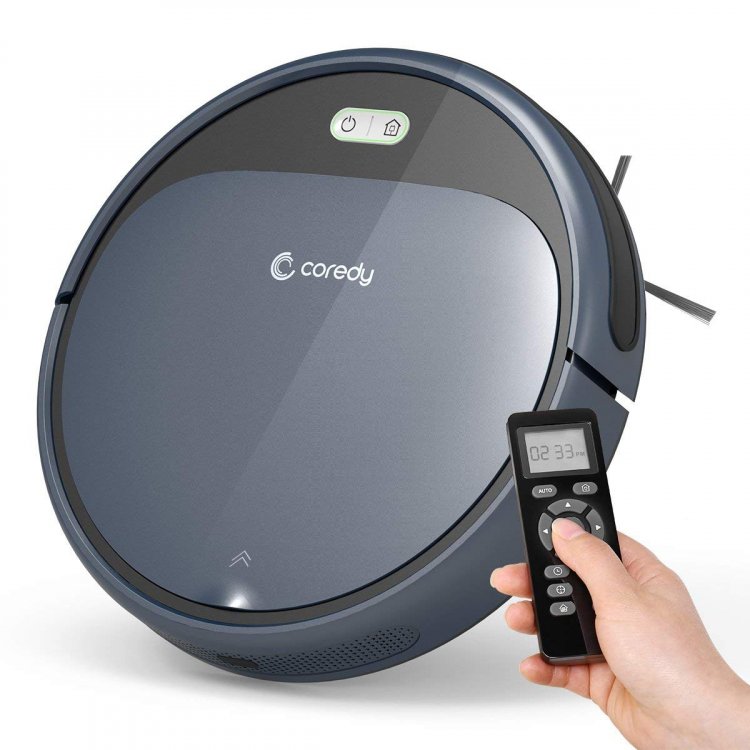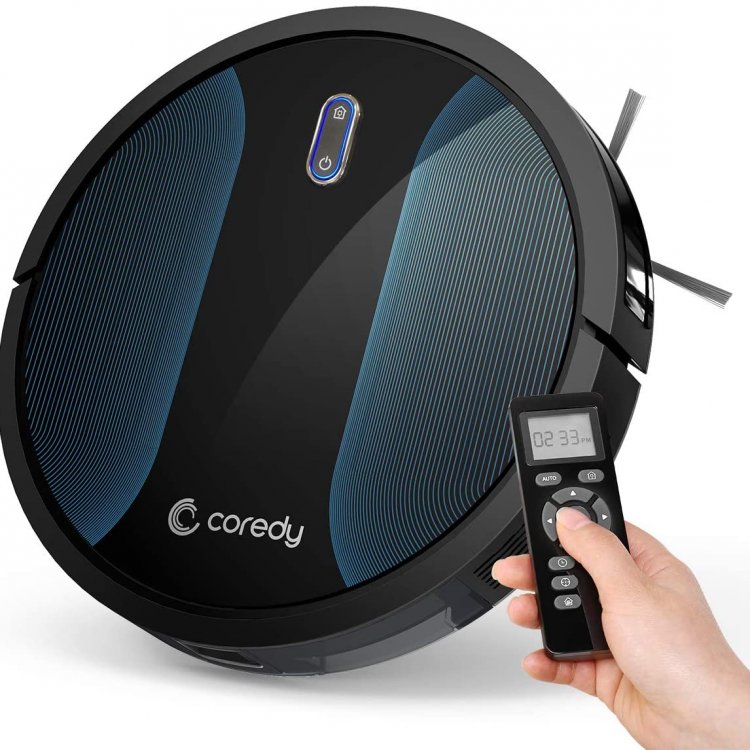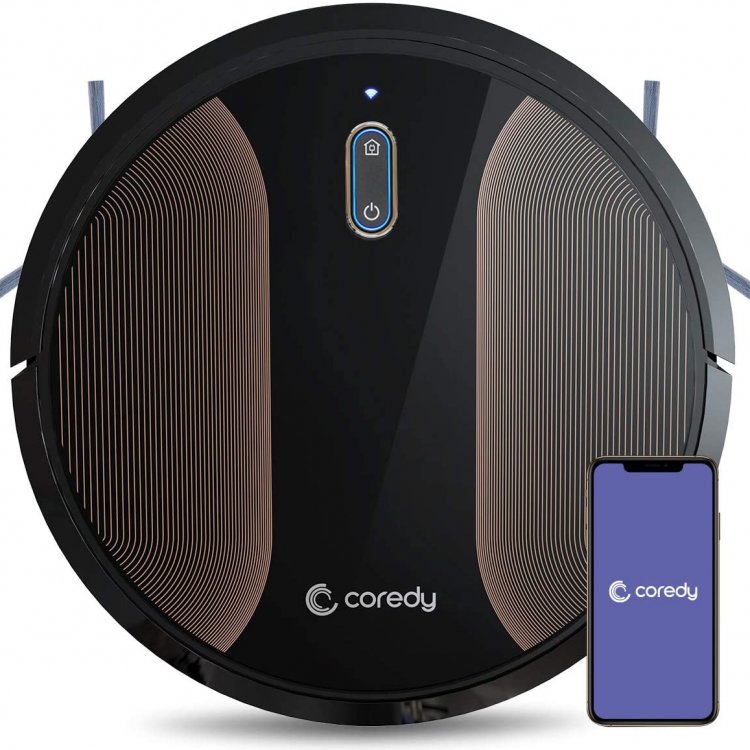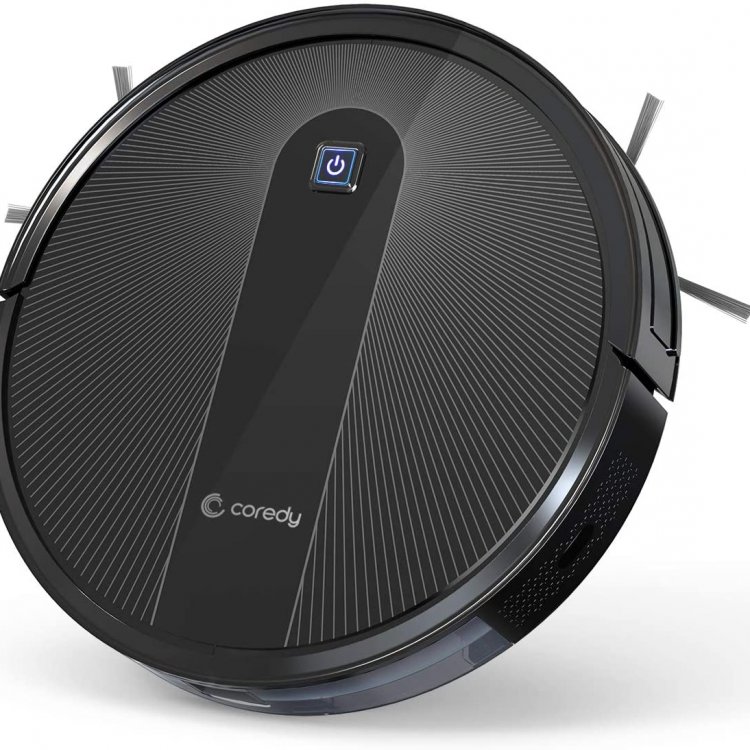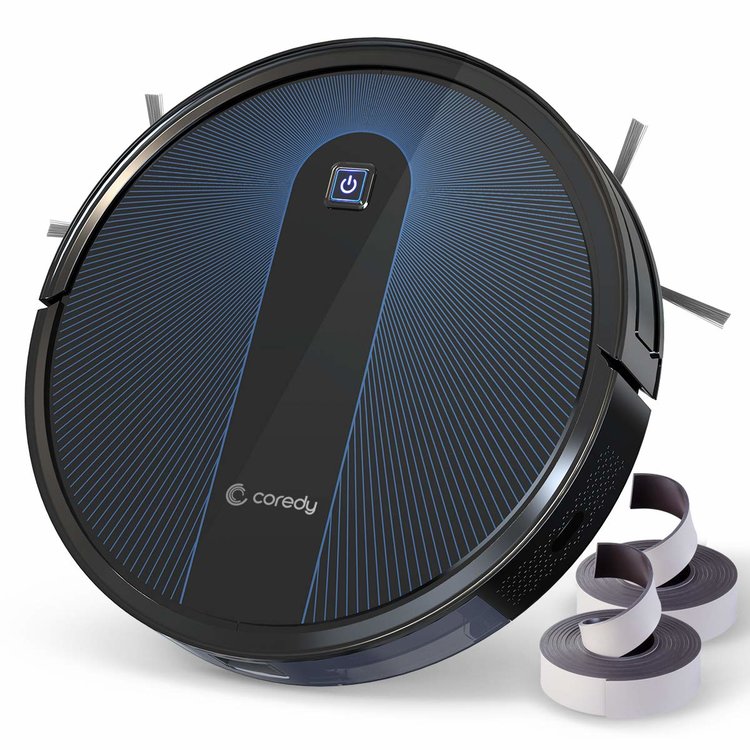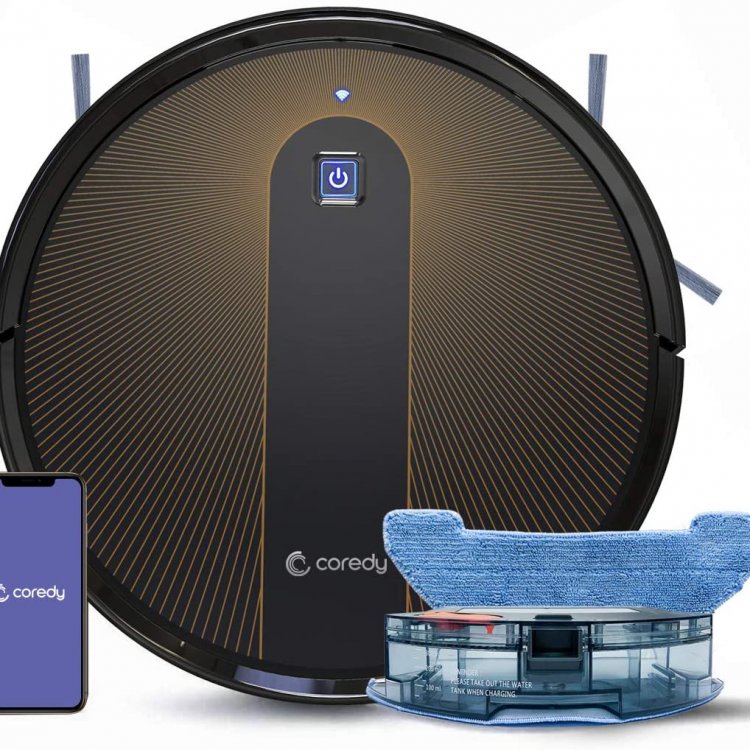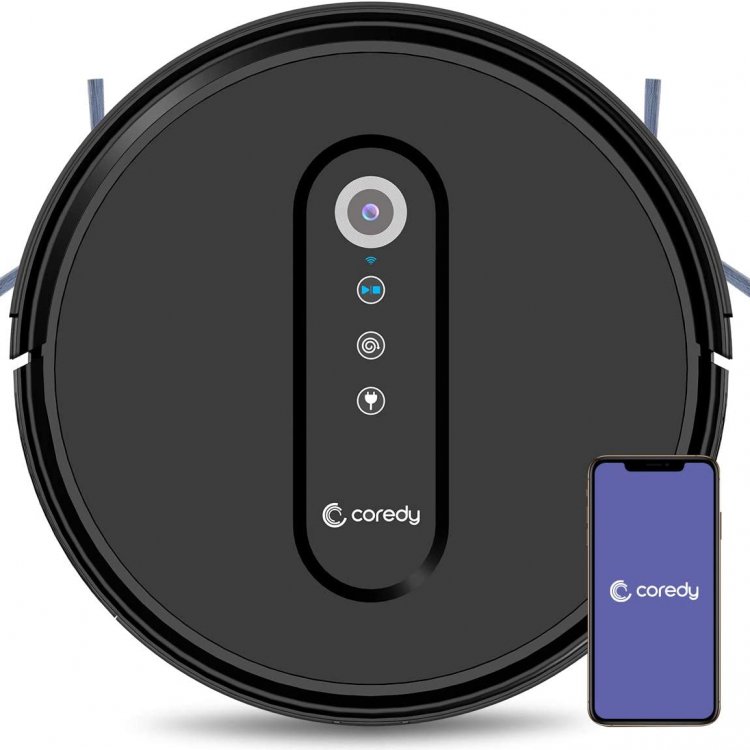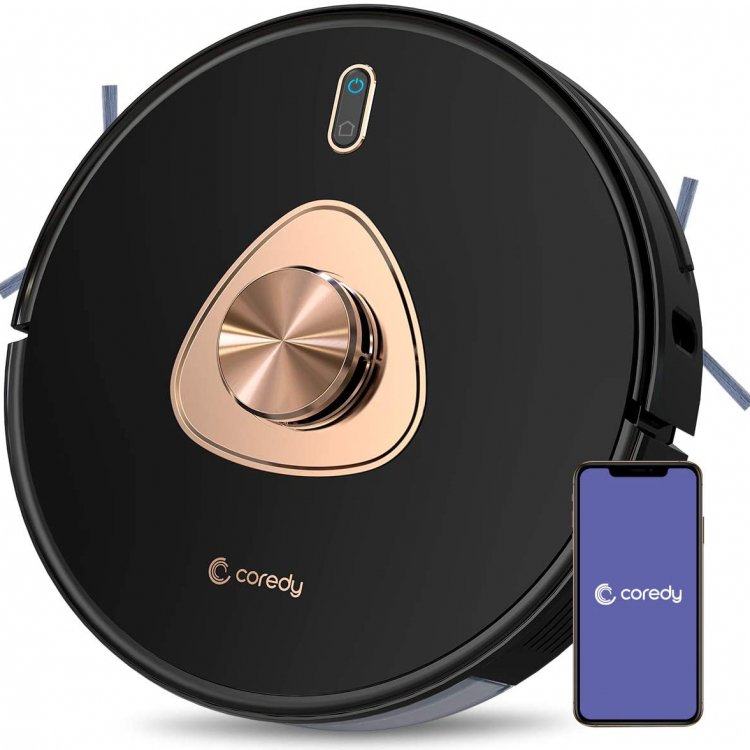The company was founded in 2011 and since then been producing robot vacuums. The lineup includes 7 models. Those are mostly budget robots made for small homes with hard floors or low-pile carpets. Only one model has mapping which means it knows where to clean so it wouldn't get lost in your home.
Unlike some other manufacturers, the Coredy gives you the possibility to buy extra accessories in case you didn’t need them in the first place when you got your first Coredy. So you can buy mopping attachments as well as boundary strips separately. This is ideal for people who are not sure whether they are going to use mopping or virtual walls or not.
So let’s see what is the difference between all Coredy models.
| Specs/Models | G800 | R750 | R650 | R600 | R580 | R500+ | R300 | L900 |
| Bin capacity, ml | 500 | 500 | 500 | 500 | 500 | 500 | 300 | 500 |
| Suction Power | 2,000 | 2,000 | 1,600 | 1,600 | 2,000 | 1,400 | 1,400 | 2,700 |
| Mopping | yes | yes | no | no | yes | yes | yes | yes |
| Mopping attachments | optionally | included | - | - | optionally | optionally | optionally | optionally |
| Water tank size | 300 ml | 300 ml | - | - | 300 ml | 300 ml | 400 ml | 380 ml |
| Boundary strips support | no | yes | yes | no | yes | yes | no | N/A |
| Boundary strips in the box | - | included | included | - | optionally | optionally | - | - |
| Mapping | yes | no | no | no | no | no | no | yes |
| Mapping technology | camera | - | - | - | - | - | - | LDS |
| Runtime, min | 110 | 120 | 120 | 120 | 120 | 120 | 110 | 200 |
| Battery capacity, mAh | 3,200 | 3,200 | 2,600 | 2,600 | 2,600 | 2,600 | 2,600 | 5,200 |
| Carpet boost | yes | yes | yes | yes | yes | no | no | N/A |
| Noise level, dB | 45-65 | 45-65 | 45-65 | 45-65 | 45-65 | 45-65 | 45-65 | 65 |
| Climbing ability, in/cm | 0.64 / 16 | 0.64 / 16 | 0.64 / 16 | 0.64 / 16 | 0.64 / 16 | 0.64 / 16 | 0.64 / 16 | N/A |
| Heigh, inch/cm | 2.77 / 7.03 | 2.77 / 7.03 | 2.77 / 7.03 | 2.77 / 7.03 | 2.7 / 6.9 | 2.7 / 6.9 | 2.7 / 6.9 | N/A |
| Wi-Fi | yes | yes | no | no | yes | no | no | yes |
| Alexa/Google Home | yes | yes | no | no | yes | no | no | yes |
| Accessories | 4 side brushes, extra high-efficiency filter, cleaning brush, charging dock, adapter | 4 side brushes, 2 x 6.6ft boundary strips, extra HEPA filter, remote control (+2 AAA batteries), charging dock, AC power adapter, cleaning tool | 4 side brushes, 2 x 6.6ft boundary strips, extra HEPA filter, remote control (+2 AAA batteries), charging dock, AC power adapter, cleaning tool | 4 side brushes, extra HEPA filter, remote control (+2 AAA batteries), charging dock, AC power adapter, cleaning tool | 4 side brushes, extra filter, remote control (+2AAA batteries), cleaning brush, charging dock, adapter | 4 side brushes, extra filter, remote control (+2AAA batteries), cleaning brush, charging dock, power adapter | 4 side brushes, extra filter, remote control (+2 AAA batteries), cleaning brush, charging dock, adapter | |
| Price | $399.99 | $279.99 | $199.99 | $$ | $289.79 | $80.99 | $72.99 | $519.99 |
Random navigation & Battery life
Almost all models in the lineup do not have mapping which means the robot randomly bounces around until the battery dies. It might get lost in big houses as it does not remember where to clean.
Because of that, robots with random navigation are better for small homes or studio apartments.
The Coredy robots without mapping are not suitale for big homes
Camera mapping
The latest and most expensive Coreedy G800 is the only model that has a built-in camera. It helps to create a map of the cleaning area so the robot knows where it should clean. Another pro of mapping is resumption.
When the robot runs out of energy but cleaning is not complete, it returns to the dock, and when it’s powered up, the G800 resumes cleaning.
If you have a big house, remember that the robot spends some time to recharge before continues cleaning which means the cleaning might take a few hours.
Carpet boost. Is a Coredy good for carpets?
The Coredy robots have a sensor that recognizes carpets. Once it does, the robot automatically increases suction for better cleaning results.
This feature helps to save battery life.
Even tho the Coredy robots have strong suction and carpet identification, most of them can not cross over an obstacle taller than 15 mm. This does not make the robots good for medium-pile carpets.
The Coredy robots are not made for medium-pile carpets but are good for hard floors and low-pile carpets
Virtual Walls
A Coredy robot might or might not have a sensor that identifies boundary strips. Those that do not have one are not compatible with the strips.
The boundary strips keep the robot off some places. Some models come with it in the box, for other you should buy the strips optionally.
You can not set a digital blocked area for any Coredy robot vacuum. The only way to prevent it from going to certain places is the boundary strips.
Do I need to buy a robot vacuum with stronger suction if I don’t have carpets?
As we said before, the Coredy robots are not suitable for medium-pile carpets.
The difference between the robot with 1,400 Pa and 2,000 Pa would be in cleaning results. On low-pile carpets, the robot that delivers 2,000 Pa suction would be able to pick up pet hair and other debris better. On hard floors, you might not notice the difference if you run the robot every other day but if it is going to be cleaning once a week or so, the one with stronger suction would be definitely better.
The Coredy R300 is the oldest and cheapest model in the lineup. It can be a 2-in-1 device if you get mopping attachments that are sold separately. It is compatible with the biggest 400 ml water tank in the model line.
The robot is not WiFi-enabled and can not be controlled by anything other than the remote control.
Since this is the oldest and most barebone model in the lineup, it would be good for small homes with almost no carpets.
Keep in mind, the R300 filter is not HEPA and is not suitable for people with allergies.
The Coredy R500+ which is known as the R550 too is similar to the R580 but lacks Alexa compatibility and WiFi as well as has weaker suction.
The robot is compatible with boundary strips but they are not coming in the box.
Mopping attachments can be bought separately.
The robot has 1,400 Pa suction and would be suitable for hard floors and some thin rugs.
Coredy R300 vs. R500+ (R550)
- The R500 has a bigger dustbin
- The R300 has the biggest water tank in the lineup
- The oldest model is not compatible with boundary strips
To sum up
The Coredy R300 is the cheapest robot vacuum suitable for small homes with a clean layout and almost no carpets.
The Coredy R500+ is better for pet owners as it has a bigger dustbin as well as is compatible with boundary strips which makes it a bit more suitable for homes with cluttered areas.
Coredy R580
Good if you don’t want extra attachments included
Supports boundary strips and has mopping but does not come with those in the box.
The Coredy R580 has strong suction and is compatible with Amazon Alexa/Google Home. It also has an app.
The boundary strips are not included in the box but the robot has a sensor that recognizes them.
It also does not have carpet identification and does not increase suction when steps on one.
Hovewer, it has a mopping function tho the mopping attachments are sold separately.
The robot runs up to 120 minutes but is not recommended for big homes as it does not have mapping.
With strong 2,000 Pa the Coredy R650 is suitable for homes with low-pile carpet and hard floors as well as pet owners.
Coredy R580 vs. R750
- Both have mopping ability but the R750 comes with mopping attachments included in the box. For the R580 the attachments are sold separately
- Boundary strips are compatible with both models, but the R750 has 2x6.6 ft strips in the box while for the R580 those can be bought optionally
- The R580 is a bit shorter than the R750.
To sum up
The R580 is cheaper and does not have boundary strips in the box as well as mopping attachments. If you do not need any of these, go with the Coredy R580.
If you are going to use mopping and have cluttered areas, you probably would want to go for the Coredy R750.
The $20 difference is not that big so maybe included extra attachments worth buying the R750.
The Coredy R600 is very similar to the Coredy R650. The only difference between the two is a sensor that recognizes boundary strips.
The R650 comes with them in the box, the R600 does not have one and also is not compatible with boundary strips.
Coredy R600 vs. R650
Both are very similar models with the only difference in the boundary strips sensor. The R600 does not have one and is not compatible with the strips.
The Coredy R650 comes with two boundary strips in the box. It does not have a mopping function nor mapping.
It boosts suction on carpets automatically.
The robot is equipped with a washable HEPA filter and has a short body to fit under most furniture.
1,600 suction makes the robot suitable for hard floors and thin carpets. Not recommended to use on thicker rugs.
The R650 is also not WiFi-enabled which means it can not be controlled by the app or Alexa/Google Home.
With a 2,600 mAh battery, the robot runs up to 120 minutes and automatically returns to the dock once the battery runs out of charge.
Coredy R650 vs. R750
- The newest model has stronger suction
- It also has a mopping ability and includes mopping attachments in the box
- The R750 has a bigger battery which means it runs longer on max mode
To sum up
The Coredy R650 is a good buy for small homes with some hard floor areas and low-pile carpets. If you don’t need mopping, this might be a good buy.
The R750 is better for homes with low-pile carpets as well as hard floors as it has stronger suction and mopping. It is almost the most expensive model but with all included attachments the Coredy R750 is the best value.
The Coredy R750 does not have mapping so it does not know where to clean. The robot randomly bounces around until its battery dies so the unit is not recommended for big houses. It might never get to some rooms as it does not know your floor layout.
The robot automatically increases suction on carpet which helps to make battery life efficient.
In the box with the robot, you can find boundary strips. Those things keep the robot of the places it might get stuck. There is a sensor that recognizes the strips.
Another feature of the R750 is mopping. The mopping attachments come in the box. A big 300 ml dustbin is electronic which means you can control water level output depending on mopping tasks.
Under the bin, there is a washable HEPA filter so the Coredy R750 is suitable for allergy sufferers.
The robot has strong 2,000 Pa suction and is good for hard floors as well as thin carpets as it does not have the best climbing ability. Not recommended to use on medium and high-pile carpets.
The app allows setting water level output, selecting cleaning modes, start and stop the robot as well as schedule it to work at a specific time.
If you have Alexa or Google Home, you can control the robot with your voice.
The robot runs up to 120 minutes on low power and automatically returns to the dock when the battery runs out of energy.
The Coredy G800 is the latest and most expensive robot vacuum in the lineup. It has a built-in camera thanks to which it knows where to clean. In the app, you can track the robot's movements in real-time.
The robot follows a back-and-forth navigation pattern so it does not leave any area untouched.
The robot also can work as a mop but the mopping attachments are not coming in the box, sold separately.
A short 2.77in body allows the robot to reach most places under furniture.
With the app, you can start and stop the robot, schedule it to work at a specific time and also watch it work in real-time, select cleaning mode, etc. You can not order the robot to clean a particular room nor set no-go zones. Aside from the app, if you have Alexa or Google Home, you can control the robot by voice commands.
Strong 2,000 Pa suction provides good cleaning performance on hard floors and carpets.
The Coredy G800 has a 3,200 mAh battery that ensures up to 110 minutes runtime on low power. Once the battery runs out of energy, it returns to the dock, recharges itself and after powering up, the robot returns to finish cleaning.
Coredy R750 vs. G800
- Both robots have mopping but only the R750 includes mopping attachments in the box
- The R750 also supports boundary strips
- The G800 has a built-in camera and knows where to clean
- It navigates back-and-forth instead of randomly bouncing around
- Because of having mapping, the G800 is suitable for bigger homes
To sum up
The Coredy R750 is the best value if you don’t need mapping and live in a small place and going to use mopping every other time.
Since the Coredy G800 has a built-in camera, it is suitable for bigger homes as it would not get lost and knows where to clean. If you want efficient navigation, not worried about the robot not being compatible with the boundary strips, and willing to spend a bit more, the Coredy G800 would be a great buy.
The L900 is the only Coredy robot vacuum that is guided by Lidar. The mopping attachments are sold separately but the robot is compatible with one of the largest water tanks (380 ml) on the market. A large battery provides up to 200 minutes of runtime.
The robot supports no-go zones and customized cleaning as well as selective cleaning which allows sending the L900 to a particular room.
The robot is the most powerful and longest-lasting in the lineup as well as being the smartest. On carpet, it automatically boosts suction to make battery life more efficient.
If you have a complex environment and a large cleaning area, the L900 would be a good option for your home.
